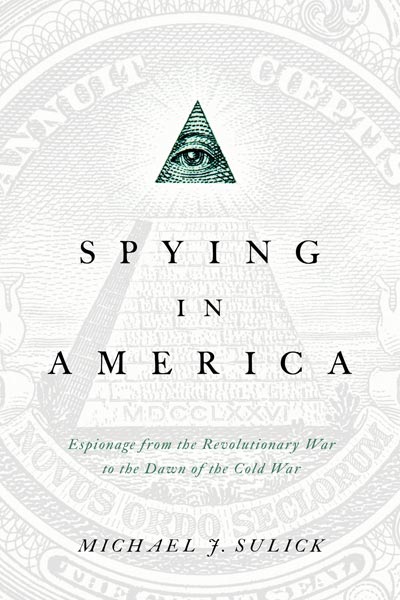 Spying in America Spying in America
Espionage from the Revolutionary War to the Dawn of the Cold War
Michael J. Sulick
Narrated by Kevin Pierce
Available from Audible
Book published by Georgetown University Press
Maybe you can, but the United States government cannot. Since the birth of the country, nations large and small, from Russia and China to Ghana and Ecuador, have stolen the most precious secrets of the United States.
Written by Michael Sulick, former director of CIA's clandestine service, Spying in America presents a history of more than thirty espionage cases inside the United States. These cases include Americans who spied against their country, spies from both the Union and Confederacy during the Civil War, and foreign agents who ran operations on American soil. Some of the stories are familiar, such as those of Benedict Arnold and Julius Rosenberg, while others, though less well known, are equally fascinating.
From the American Revolution, through the Civil War and two World Wars, to the atomic age of the Manhattan Project, Sulick details the lives of those who have betrayed America's secrets. In each case he focuses on the motivations that drove these individuals to spy, their access and the secrets they betrayed, their tradecraft or techniques for concealing their espionage, their exposure and punishment, and the damage they ultimately inflicted on America's national security.
Spying in America serves as the perfect introduction to the early history of espionage in America. Sulick's unique experience as a senior intelligence officer is evident as he skillfully guides the reader through these cases of intrigue, deftly illustrating the evolution of American awareness about espionage and the fitful development of American counterespionage leading up to the Cold War.
The book's sequel, American Spies, is also available from University Press Audiobooks.
Michael J. Sulick is a retired intelligence operations officer who worked for the CIA for twenty-eight years. He served as chief of CIA counterintelligence from 2002 to 2004 and as director of the National Clandestine Service from 2007 to 2010, where he was responsible for supervising the agency's covert collection operations and coordinating the espionage activities of the US intelligence community.
REVIEWS:
“Sulick's book is an extraordinarily valuable addition to the historical literature on espionage. In it he adds new insight on some of the well-known instances of spying in America but more importantly he illuminates many of the lesser known cases that hold important lessons for scholars and practitioners alike. In doing so, he brings to life an aspect of American history that few understand or know about and performs a genuine service to both the academic and national security professions.”
—John McLaughlin, Former Deputy Director and Acting Director, CIA “Spying In America reveals how important espionage has been to the American chronicle. Historian Michael Sulick tells the story from a unique perspective: a career clandestine services officer who knows what is important. As motivating as Lawrence of Arabia; as insightful as le Carré; as reliable as David McCullough ... indispensable reading for a basic foundation.”
—Hayden B. Peake, former army and CIA intelligence officer “As a former CIA chief of counterintelligence and director of the National Clandestine Service, Sulick offers glimpses into the motivations, operations, and mistakes of both individuals and nations in this examination of 30 acts of espionage. His simple style breezes the reader through one individual and era of American history after another. These annals read like fiction, which plays into Sulick's statement that, due to our unique geographical location and emphasis on individual liberties, Americans possess a disbelief that the threat of espionage exists within our borders, yet as Sulick proves with this broad work, foreign attempts at espionage have existed since the country's inception and will surely continue.”
—Publishers Weekly “Recognizing a gap in the subject literature, Sulick, a 28-year veteran of the CIA, including years overseeing its clandestine and counterintelligence departments, has written an informative collection of case studies, rather than a narrative history, reviewing some of the most important espionage activities against the United States and within its borders. He highlights the tradecraft of the spies, their access to secret information, American bureaucratic turf wars, and (in many cases very belated) counterespionage efforts. What is most interesting are the motivations of citizens to betray their own country in contrast to those sent here to spy on us... The author certainly knows the subject inside and out. This is an easy-to-read introduction for interested laypersons or those taking beginning courses on the history of intelligence operations.”
—Library Journal
|

